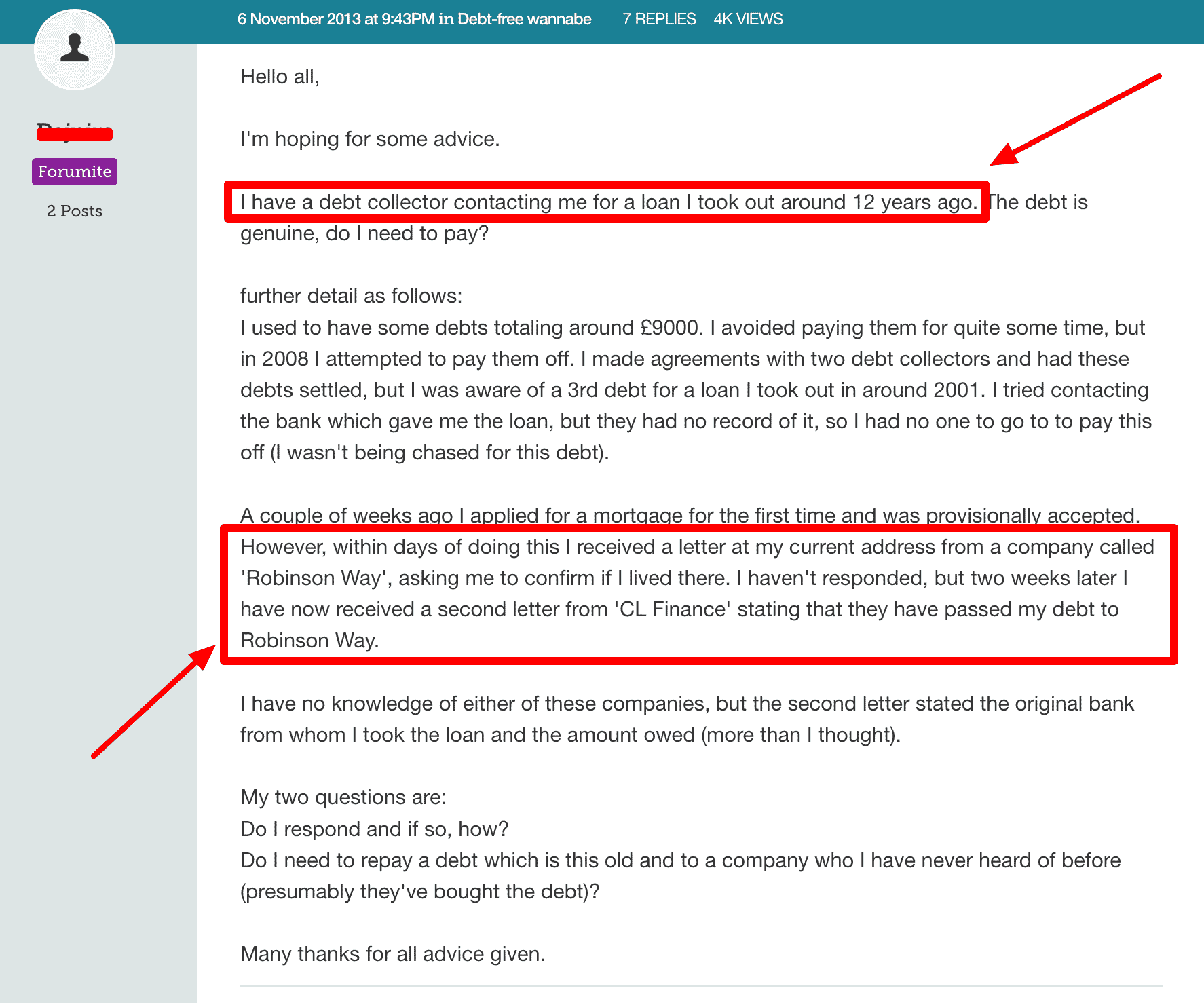Bluestone Debt Credit Management, HMRC – Should You Pay?
For free & impartial money advice you can visit MoneyHelper. We work with The Debt Advice Service who provide information about your options. This isn’t a full fact-find, some debt solutions may not be suitable in all circumstances, ongoing fees might apply & your credit rating may be affected.

For free & impartial money advice you can visit MoneyHelper. We work with The Debt Advice Service who provide information about your options. This isn’t a full fact-find, some debt solutions may not be suitable in all circumstances, ongoing fees might apply & your credit rating may be affected.
Receiving an unexpected letter from a debt collector can be worrying. You might be asking where this debt has come from, should you pay it, or whether it’s even real. If this sounds familiar, don’t panic. We’re here to help.
Every month, over 170,000 people visit us for advice on dealing with debt, and nearly half of the individuals who deal with debt collection agencies have experienced harassment or aggression1, so if this is your case, you’re not alone. We understand your concerns, so we’ll answer your questions about Bluestone Credit Management and HMRC and what you should do next.
In this article, we’ll explain:
- Who Bluestone Consumer Finance Limited are and why they might be contacting you.
- How to understand your situation, including whether you owe money or if your debt is statute barred.
- What your rights are and what actions Bluestone can take.
- How dealing with Bluestone can affect your credit score.
- What your next steps could be, including how to arrange payment or complain if needed.
By the end, you’ll know more about Bluestone and feel more in control of your situation. Let’s start exploring your options.
Understand your situation
Once you know who you’re dealing with, it’s time to focus on getting to grips with your situation. There are a few things that you need to consider at this stage:
Do you owe the money?
The first thing you need to confirm is whether or not you owe the money that they’re claiming you do. When they write to you, they should outline all of the necessary details. However, you want to make sure that the information is correct. You should also compare it to your own records.
Follow our ‘prove it’ guide with letter templates and get them to prove that you owe the money.
Is it statute-barred?
If it has been 6 years – or 5 years in Scotland – since you last paid towards your unsecured debts and you have not written to your creditor about your debt during this time, it is statute-barred.
This means that the debt is not enforceable.
It still technically exists, and you still technically owe the money, but there is no legal way for you to be forced to pay or for the debt to be enforced.
Keep in mind that not all debts become statute-barred!
Any HMRC debts, for example, will stay enforceable for decades. Any debt that had a County Court Judgement (CCJ) attached to it during the 5 or 6-year window it will be enforceable for the duration of the CCJ.
Can you afford to pay?
Everyone has to pay their debts at some point. Check your financial situation and determine whether or not you can pay back the money, either in one lump sum or in monthly instalments.
Know your rights
Once you’ve understood the situation in more detail, it’s time to think about what your rights are and what companies like Bluestone debt collection can do. Fortunately, dealing with debt collectors in the UK is quite straightforward as they are usually regulated by the Financial Conduct Authority (FCA) so have to stick to their rules.
There are many things debt collectors can’t do, so please check out our article on your rights to avoid being caught by surprise. Here’s a quick table summarizing the key aspects.
| Debt Collectors Can | But They Can’t |
|---|---|
| Contact you by phone or mail. | Call you after 9pm or before 8am. |
| Conduct home visits (on rare occasions) and knock on your door. | Forbily enter your home, or stay if you ask them to leave. |
| Threaten to take you to court by suing you for payment on a debt. | Harrass you, including threats of violence, repeated calls and visits, or abusive language. |
| Negotiate a debt settlement. Tip: make sure to get this new arrangement in writing. | Visit your workplace. |
| Access your bank account, but only after a court judgment has been made. | Take anything from your home or threaten to do so. |
| Sell your debt. | Speak to other people about your debt without your permission. |
| Contact you frequently. | Keep doing so if you request that they reduce communications. |
Your rights
There are a few things that are worth knowing when it comes to dealing with any debt collectors. These can make sure your rights are protected at all times:
- They cannot verbally or physically harass or abuse you
- They cannot speak to anyone else about your debt without your consent
- They cannot force entry into your home or seize your belongings
- They cannot pretend to have legal powers that they don’t have – like the right to enter your home.
If a debt collector does visit your home, you do not have to let them in, and they can’t force entry. They also have no right to take your belongings.
Actions they can take
Debt collectors don’t have any special legal powers when it comes to recovering money. However, they can contact you via phone and email, and they can visit you in-person.
Additionally, they may be able to add extra fees or charges to your debt but only in line with your initial agreement with your original creditor.
If you ignore them or miss some payments, Bluestone may get a County Court Judgement (CCJ) against you.
A CCJ is an order from the courts where a judge agrees that you owe Bluestone money.
You have to pay a CCJ, but they will usually include a payment schedule or a final deadline.
Additionally, Janine, our financial expert, explained that while debt collectors can visit your home for payments, they cannot come to your workplace, act threateningly, force payment, or discuss your finances with others. If they violate these rules, you can complain.
» TAKE ACTION NOW: Fill out the short debt form
Will They Give Up Chasing?
After all that you might be wondering whether you can just wait it out and hope they stop chasing you.
Sadly, that’s probably not going to happen. Most debt collectors are persistent.

Source: Moneysavingexpert
As you can see Robinson Way starting to chase a debtor mere days after their mortgage application and a full 12 years after the debt was originally chased.
Other agencies like Lowell Group, Portfolio Recovery and Cabot Financial are constantly being accused of buying Statute Barred debts and then chasing people for payment.
How a debt solution could help
Some debt solutions can:
- Stop nasty calls from creditors
- Freeze interest and charges
- Reduce your monthly payments
A few debt solutions can even result in writing off some of your debt.
Here’s an example:
Situation
| Monthly income | £2,504 |
| Monthly expenses | £2,345 |
| Total debt | £32,049 |
Monthly debt repayments
| Before | £587 |
| After | £158 |
£429 reduction in monthly payments
If you want to learn what debt solutions are available to you, click the button below to get started.
Can You get a debt solution?
If you have unsecured debts that Bluestone Credit are chasing you for, you might benefit from a debt solution.
Since the average unsecured debt has increased by 25% year-on-year, rising to £13,9412, there are several different debt solutions available in the UK, so we recommend speaking to a debt charity as soon as possible.
Their advisers will be able to walk you through your options and make sure that you are choosing the best debt solution for you.
Debt Management Plan (DMP)
A DMP is an informal debt solution that lets you pay off your debts via a single monthly payment.
Because it is informal, it is not legally binding so you are not tied into a DMP for a minimum number of payments.
Individual Voluntary Arrangement (IVA)
An IVA is a formal agreement between you and your creditors. You agree to pay a monthly sum that is distributed amongst your debts, and your creditors agree not to contact you during your IVA.
IVAs typically last for 5 or 6 years, and any outstanding debt is wiped off when it ends.
Keep in mind that IVAs are not suitable for everyone. You need to owe several thousand pounds to more than one creditor to be eligible. You also need to demonstrate that you have some disposable income every month.
Trust Deed
IVAs are not available in Scotland. Instead, you will need to opt for a Trust Deed.
Trust Deeds work in the same way as an IVA – you pay an agreed sum each month that is shared amongst your creditors, they can’t contact you, and any leftover debt at the end of your Trust Deed term is written off.
Debt Relief Order (DRO)
A DRO is a good option for those facing financial hardship with no assets and little income.
For 12 months, you make no payments, but your creditors freeze your interest and don’t contact you.
If your finances haven’t improved during this year, you may be able to write off your unsecured debts.
Bankruptcy
If you have debts but no realistic possibility of ever paying them off, you may need to declare bankruptcy.
Bankruptcy has an unfair stigma attached to it as it may be your only way of getting a financial fresh start. That said, it is a serious financial situation that should not be taken lightly.
Sequestration
Sequestration is the Scottish version of bankruptcy.If you have little income and no valuable assets, you may be able to apply for a minimal asset process bankruptcy (MAP). A MAP is a quicker, cheaper, and more straightforward version of sequestration, so worth considering.
How Can You complain about Bluestone Credit Management?
If you think that Bluestone Credit has been unreasonable or behaved inappropriately, you can make a complaint. You can also make a complaint if you feel that they have broken any of the Financial Conduct Authority’s (FCA) guidelines.
Make your first complaint to Bluestone so that they have the chance to sort out the issue themselves. If you feel that they have not taken your complaint seriously enough or have not addressed your issue properly, you can escalate matters.
You can make any secondary complaint to the Financial Ombudsman Service (FOS). They will investigate and, if your complaint is upheld, Bluestone Credit may be fined. You could even be owed compensation.
Bluestone Debt Credit Management Contact Information
| Post: | Bluestone Credit Management, PO 3763, Sheffield, S9 9AB |
| Phone: | HRMC accounts 0114 231 7509 Company house accounts 0114 212 8531 All other accounts 0114 212 8644 |
| Email: | [email protected] |
| Website: | https://bluestonecm.co.uk/ |

